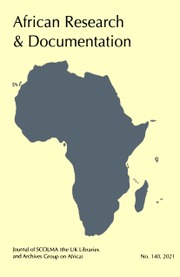No CrossRef data available.
Article contents
Endless Possibilities: Why Africa keeps travel writing alive
Published online by Cambridge University Press: 25 April 2022
Extract
Why do we travel? Sometimes we are curious, sometimes we are looking for profit; sometimes we are escaping the mundane or running away from circumstances; some travellers are looking for romance or a chance to immerse themselves in a landscape they love. We travel to understand ourselves as well as the place we are visiting. And our journeys reveal hidden aspects of our character. We may become more adventurous, or perhaps surprise ourselves with our timidity or latent prejudices.
It is hard to pin down exactly when travel as a recognised genre first began. Expeditions are one of the oldest human endeavours, and people, be they military officers, missionaries, explorers, scientists or migrants, have combined it with literature ever since linear alphabets were invented. Travel writing as a genre is thought to have begun with Herodotus, the Greek historiographer, who reported from foreign lands in the fifth century BC. Travel literature became popular in China during the Song Dynasty between the 10th and 13th centuries, and it featured strongly in Arab literature from the 15th century onwards.
- Type
- Articles
- Information
- Copyright
- Copyright © International African Institute 2014




